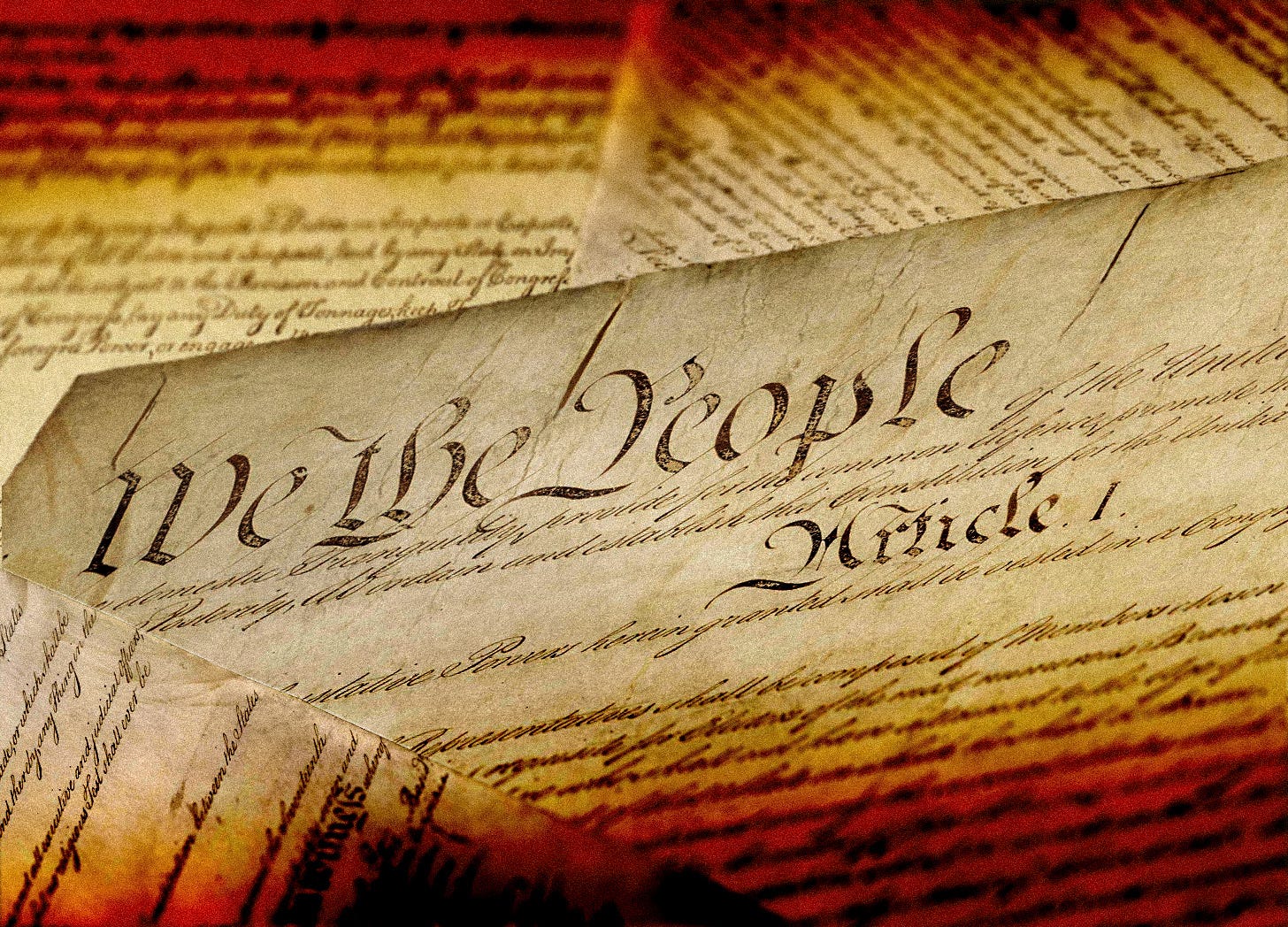Restoring Sanity and Humanity to the Immigration System Requires Putting Enforcement Under Article I Congressional Courts
Leaving it to the executive-controlled Justice Department has led to politicization, instability, and the erosion of due process
The United States immigration court system, currently housed within the Department of Justice, was originally intended to serve as a neutral forum for adjudicating immigration cases. For years, critics have argued that its structural placement under the executive branch has compromised its impartiality, turning it into a mechanism of immigration enforcement rather than a fair judicial body. Under the second administration of President Donald Trump, these critics have proven to be prescient.
Only a few months into the second Trump term, the immigration courts have been weaponized against immigrants and are rapidly losing indicia of due process. To reverse this degradation of the immigration courts, Congress should restructure them into an independent Article I court system and bring this system under its own control. Only then is it likely that justice and due process can be restored to the immigration courts.
A Conflict of Interest
The federal system has different types of tribunals today. Most people are familiar with the fully independent United States federal courts established under Article III of the U.S. Constitution. But there are also independent courts set up pursuant to Article I, Section 8 of the Constitution, which grants Congress the power to “constitute Tribunals inferior to the Supreme Court.” Congress has exercised that authority to create specialized courts, including the U.S. Tax Court, the Court of Appeals for Veterans Claims, and the U.S. Bankruptcy Court.
Unlike Article III federal courts or Article I independent courts, right now, immigration courts are administrative tribunals under the Executive Office for Immigration Review (EOIR), a sub-agency of the Department of Justice. Immigration judges are DOJ employees, and their decisions are subject to review by the attorney general, a political appointee. This structure creates a profound conflict of interest: the same department that prosecutes immigration violations also controls the judges who rule on those cases.
Many experts have long argued that placing immigration courts within the DOJ undermines the rule of law and allows political appointees to manipulate legal outcomes for ideological or political gain. These warnings have been realized under the second Trump Administration, which has now aimed the immigration courts against immigrants in an effort to deport as many people as possible, without regard to their due process rights. Most famously, the administration removed Kilmar Abrego Garcia to El Salvador without a court hearing years after his petition to pause removal was granted, later claiming “administrative error.” In other cases, advocates have accused immigration judges of colluding with the administration’s goal by granting government trial attorneys’ motions to dismiss cases of unrepresented immigrants, before Immigration and Customs Enforcement arrests them directly outside of the courtroom.
The Flaws in the System
The vulnerability of immigration courts to political interference is not new under the current administration; it is a “built in” feature due to the poor design of the system. This has long allowed attorneys general to use their authority to issue precedent-setting decisions that reshape immigration law without congressional input. For example, former Attorney General Jeff Sessions issued decisions that restricted asylum eligibility and curtailed judges’ ability to close cases administratively, effectively mandating deportation in many instances. Immigration policy shifts have thus not been the result of democratic deliberation but of executive fiat. Immigration judges have not been truly independent—they are subject to the whims of the attorney general, who can change the law overnight.
Another historical example of political manipulation occurred during the George W. Bush administration, when a DOJ investigation found that immigration judge appointments were influenced by political affiliation, violating civil service rules. Said appointees were later criticized by federal courts for ordering the removal of asylum seekers to countries where they would face persecution. Furthermore, the politicized appointments slowed the hiring process for immigration judges overall, and the subsequent vacancies created a growing backlog in the adjudication of immigration cases. This scandal highlighted the susceptibility of the system to partisan abuse.
Likewise, the first Trump administration implemented performance quotas for immigration judges in 2018. Judges were required to complete 700 cases per year to receive a satisfactory performance rating, a policy widely criticized for undermining judicial independence and due process by incentivizing judges to do shoddy work and fast-track deportations.
In yet another example, in the case of Matter of A-B-,Respondent, Sessions reversed a prior decision that had granted asylum to a Salvadoran woman fleeing domestic violence. This reversal significantly narrowed the grounds for asylum and demonstrated how a single political appointee could reshape immigration law. As soon as a Democratic administration was elected, the decision was promptly reversed. And on Sept. 2, 2025, Attorney General Pam Bondi reversed the case yet again, illustrating how immigration “law” had become the policy preferences of the executive branch, divorced from the laws passed by Congress.
Deportation Mills
Under Trump 2.0, the structural vulnerability of the immigration courts has accelerated. And now it is not even the attorney general who is changing the law—it is interim bureaucrats like Acting Executive Office for Immigration Review Director Sirce Owen who are making up their own laws and ordering the immigration courts to comply.
In April 2025, Owen issued Policy Memorandum 25-28, which significantly alters the adjudication of asylum claims in U.S. immigration courts. The memo directs immigration judges to summarily deny asylum applications without a full hearing if the application is deemed legally insufficient on its face. This procedural shift places a substantial burden on asylum seekers, who now must present airtight legal arguments in their initial filings when they have not even had a chance to obtain help to understand the requirements.
Although framed as a tool for docket efficiency, the policy effectively encourages judges to clear cases quickly by denying relief early at the expense of fairness and individualized review. Most asylum seekers do not have attorneys representing them, and asylum seekers without legal representation—who already face steep odds—are especially vulnerable. They may not understand the complex legal standards required to survive pretermission, leading to unjust denials.
By allowing judges to deny claims without oral testimony or evidentiary hearings, this memorandum undermines traditional due process protections and the United States’s legal obligations to those seeking asylum. Many asylum claims hinge on credibility, which is difficult to assess without live testimony.
The underlying flaw that allows for the denial of due process in immigration courts is structural: Truly fair courts should not be subject to the whims of a political appointee, much less an unelected “acting” bureaucrat. The Trump administration has created its very own “deep state,” but for deportations.
The consequences of this structural flaw are most acutely felt by immigrants themselves but also by the immigration judges, who are now mandated to violate due process. Moreover, due to DOJ and Department of Homeland Security policies, immigration judges face crushing caseloads—often exceeding thousands of cases per judge—and are subject to performance metrics that prioritize speed over fairness. The passage of the One Big Beautiful Bill Act will only exacerbate this issue by increasing the government’s funding for detention and deportation manifold, while capping the number of immigration judges. Many immigrants appear in court without legal representation, facing trained government attorneys in a system that is already stacked against them. The reality now is that immigration courts function more like deportation mills than impartial tribunals.
The current system is designed to deport people, not to give them a fair hearing. It does the opposite of what courts are supposed to: It increases the prerogatives of the state at the expense of the rights of individuals.
Make Article I Great Again
Project 2025, a policy blueprint spearheaded by the Heritage Foundation and other conservative organizations, outlined a sweeping plan to reshape the federal government, including immigration adjudication, exactly in the wrong direction. The initiative proposed consolidating immigration authority under the executive branch, increasing the power of DHS, and reducing the independence of immigration judges. The plan emphasized rapid deportation processes and sought to eliminate what it describes as bureaucratic obstacles to enforcement, including judicial discretion in immigration courts. It sought to further entrench the immigration courts within the executive enforcement apparatus, exacerbating concerns about due process and impartiality.
In contrast, the American Bar Association has long advocated for removing immigration courts from the DOJ. In its comprehensive 2019 report, Reforming the Immigration System, the ABA outlined structural reforms to promote “independence, fairness, efficiency, and professionalism” in the adjudication of removal cases. The ABA emphasized that immigration courts lack basic due process protections and are vulnerable to political manipulation. It recommended the creation of an independent immigration court system with safeguards akin to those in other federal courts, including protections for judicial tenure and impartial case management.
To restore integrity, fairness, and public confidence, Congress should restructure the immigration courts as independent Article I courts, similar to the U.S. Tax Court or Bankruptcy Court. Such a restructuring would insulate judges from political interference, allow for consistent legal standards, and ensure that immigration law is applied impartially. Such a change would reverse the worst excesses of Trump’s subversion of the immigration courts and the abusive treatment of immigrants.
This would require a Congress that actually wants to assert its own constitutional powers. Yet the placement of immigration courts within the DOJ has clearly eroded their legitimacy and weaponized them against the concept of due process and put judges in a position of having to compromise their integrity on a daily basis. Establishing an independent immigration court system is not just a policy preference—at this point in American history, it is a constitutional and moral imperative.
© The UnPopulist, 2025
Follow us on Bluesky, Threads, YouTube, TikTok, Facebook, Instagram, and X.
We welcome your reactions and replies. Please adhere to our comments policy.










Good read 👏🏼. No one is illegal.
We need The Creation of The Immigration Congressional Court under The Immigration Committee.